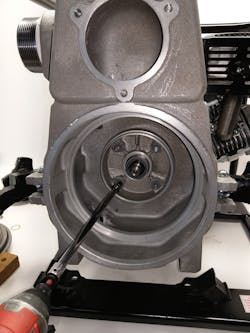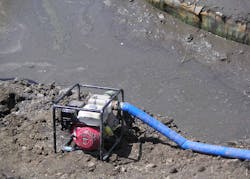Choosing the right pump for dewatering applications is crucial to ensure maximum performance and cost effectiveness. There are two broad categories of pumps: diesel driven pumps and electric submersible pumps. While there may be a need for both types of pumps, it is important to determine which pump type is suitable for the particular application.
Typically, dewatering is the first undertaking on a construction jobsite. There are circumstances when a diesel pump would make the most sense, particularly when there is no electricity and a generator is unavailable. However, with environmental regulations and the rising cost of diesel fuel, the industry has seen a shift to electric submersible pumps in the recent decades. Electric submersible pumps have numerous advantages over fuel and diesel-driven pumps, making them the top choice for construction, mining and utility projects.
5 reasons electric pumps are contractors’ first choice
1. Continuous work
If there is a need for a pump to operate continuously on the jobsite, electric pumps might be the most reasonable option. They can work continuously without damage or failure, as long as they can stay plugged in to a stable, continuous power supply. Typically, electric pumps are the first choice for any dewatering application or industrial process that needs to pump liquid for more than 20 minutes per cycle, as diesel pumps require maintenance more frequently. Diesel or gas-engine pumps demand several interruptions for refueling, which ultimately delays the work and increases the final cost. In many cases, a technician is required to watch the working pump 24 hours a day per specific local government, Occupation Safety and Health Administration (OSHA) and labor union regulations.
2. High altitude
Many people are not aware of this issue, but altitude can affect gas and diesel engine pumps’ performance. That is because the higher the altitude, the lower the pressure, which can make it harder for pumps to do their jobs with the same efficiency as at sea level. For example, an engine pump in Denver, Colorado, with an elevation of 5,280 ft, will see suction lift reduced by 30%. To make it easier to understand: a pump rated with 10 ft suction power at sea level will provide only 7 ft suction lift at 5,280 ft altitude.
In addition, as the oxygen thins out and becomes less dense, gas and diesel engines require a wider throttle opening to pull in adequate amounts of air, which in turn means more fuel being burned, which increases costs. High altitudes or atmospheric pressure does not affect electric pumps – they can operate at full capacity and deliver great performance while eliminating additional fuel costs.
3. Overall cost
It is typically more cost effective to run an electric pump over an engine driven pump for a simple reason: electric power costs less than fuel. In general, contractors can experience savings up to 50% or more using electric power on the job site.
Electric pumps are also advantageous when considering maintenance costs. As the design and manufacturing of electric pumps have evolved, they have been built to be extremely durable and wear resistant. This has allowed maintenance service fees over time to be much more affordable, at lower frequencies. Most standard diesel engine pumps need oil and filter change after a certain number of hours of use, which means extra stoppages and additional costs. Electric submersibles are also portable, which means they are much easier to transport around the jobsite, easing the workload.
4. Environmentally friendly
As concerns about global warming have risen in recent years, companies have been embracing cleaner ways to run equipment engines. Burning fossil fuel such as gas and diesel to power a water pump produces greenhouse gas emissions, which ultimately increases the damage to the environment. Electric pumps are a more environmentally friendly option, especially if the electricity used to run their engines comes from solar, wind and other alternative power sources. In addition, electric submersible pumps are much quieter, which can be a huge advantage depending on the jobsite location.
It is also important to keep in mind that gas or diesel-driven pumps should definitely be avoided in work areas where there is a high risk that fuel could spark an explosion. Fuel powered pumps should also be avoided in areas where any spillages could cause harm to the wildlife, or in areas where nearby water is used to supply drinking water. This risk is eliminated by using submersible electric pumps.
5. Cavitation
Cavitation occurs when air bubbles are generated inside a pump due to a drop in pressure, turning the liquid into vapor and, as the pump’s impellers spin, back to liquid again. The air bubbles that are formed instantaneously implode, eroding the impeller surface, causing decreased pump performance and premature pump failure.
Without getting into specific detail, two types of cavitation are possible: suction and discharge. The more common type, suction cavitation, is virtually eliminated with an electric submersible pump, which has an open suction near the pump impeller and does not rely on a hose to draw liquid through a long suction hose.
Discharge cavitation can occur in a submersible pump, but is less likely and can be eliminated by following manufacturers’ minimum required submergence and running the pump at or near its best efficiency point (BEP).
Mike Klimes is an application engineer for Tsurumi (America) Inc., a division of Tsurumi Manufacturing, and has more than 20 years of engineering and manufacturing experience. He is responsible for solving customer issues by offering in-depth performance analysis through the complete life cycle of pumping applications. Klimes joined Processing’s editorial advisory board in 2019.
Tsurumi (America) Inc. has provided industry-leading pumping technology in construction, civil engineering, mining, industrial wastewater, domestic wastewater, sewage treatment, flood control and scenery creation fields for more than 40 years. For more information, call 630-793-0127 or visit tsurumipump.com.



